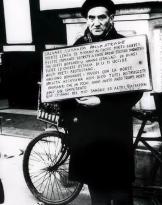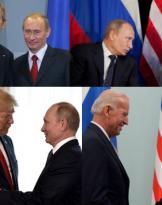If you were to ask your children how they would describe a soldier, they will surely tell you: very strong, muscular, armed and fearless.
In History and therefore also in modern society, the soldiers remain anchored to a rather cruel stereotype: war machines ready to kill anyone without feelings, automata without fear.
Thanks to the growing development of psychology and the increasing attention to the soldiers, we can now ask ourselves: but in the mind of a soldier what mechanisms do they trigger when in combat?
In our beautiful country, already to discuss something related to the military sphere, we must arm ourselves with great patience, let alone mix two taboos like psychology and war.
Italy bases the use of its men on a millenarian stereotype now outdated, everywhere and anyone has understood that to get the best from the soldiers it is necessary first and foremost to protect the men and women who are in a uniform.
Needless to say, the soldier and his psychophysical abilities are held in great consideration in the United States.
In-depth research, open support centers are carried out and there is even a rather important line of research in universities.
Surely the American military phenomenon is of a different scope than the Italian one, there are different numbers and different operations, however, the human physiology is the same.
 Ranger Colonel Dave Grossman is one of the world's leading scholars in the field of human aggression and violent crime.
Ranger Colonel Dave Grossman is one of the world's leading scholars in the field of human aggression and violent crime.
A new defined science has opened up from his pen and his research Killology where one tries to give an understanding to the act of killing in combat, the psychological costs of war, the roots of violent crime and the healing process of victims of violence.
Dave Grossman is called to collaborate with military academies across the country to prepare and instruct men in arms to what is the worst side of the war: to kill and be killed.
His is not an easy task, what he has to say is not always pleasant indeed, most of the time he breaks the stereotype that we had made of the soldier "all muscles and violence".
In his research he lays bare the weaknesses of the human body before the fear of death and combat, not to belittle or humiliate but to understand and accept that even a soldier may not be perfect.
Thanks to his successes in publishing and academics, the colonel was able to help many soldiers to have greater awareness of the functioning of their body during the fight and has saved several from the oblivion of the post-traumatic stress disorder.
To better understand when exposed by Colonel Grossman in his studies it is important to start from a concept that has more affinity with psychiatry than the military world: the Universal Human Phobia.
This concept gives a name to a phenomenon that we all know: the fear that another human being attacks us.
Phobia is that irrational, oppressive and uncontrollable fear towards a specific object or event. We all have phobias, some more rational than others.
Universal Human Phobia is that terror that attacks us when another human being attacks us physically. We bring a practical example.
Imagine that we are in a waiting room full of people, all intends to wait their turn, if an armed person broke into this room and began to shoot on the crowd the reaction of all present would be phobic.
Anyone would begin to huddle toward the emergency doors, seek shelter, would save their lives.
 When the factor that causes stress is human, the trauma is more severe than a natural or casual event. When it is another human being to create fear and suffering, then our mind reacts more intensely and destructively.
When the factor that causes stress is human, the trauma is more severe than a natural or casual event. When it is another human being to create fear and suffering, then our mind reacts more intensely and destructively.
Our reaction when we hear gunshots or in an extremely dangerous situation is to get as far away from the threat as possible. To meet the situation of danger is an absolutely unnatural concept, yet this is what we ask of our men and women in uniform.
The company asks the soldiers (including policemen) to launch towards the Universal Human Phobia and to fight it, if we create acute stress when we can escape, let's imagine what happens in the mind of those who have to deal with it every day.
So why do warriors (policemen, soldiers and all operators in crisis areas) go against their biggest fear?
The psychologist Abrahm Maslow tries to answer these questions with his Scale of Needs.
According to Maslow, man must satisfy his needs with a scale of priorities that starts from the basic needs on which the less important ones are based. At the base of everything is the need for a safe and safe environment.
The warriors, in all their facets, tend to create the fundamental need for security on which the basis of human society is based, without them, society collapses.
 Described the psychological and behavioral bases with which the security operators are confronted every day, Grossman goes on to analyze what are the physiological changes that a body can undergo in combat or soon after.
Described the psychological and behavioral bases with which the security operators are confronted every day, Grossman goes on to analyze what are the physiological changes that a body can undergo in combat or soon after.
The Autonomous Nervous System (SNA) compacts the sympathetic nervous system (SNS) and the parasympathetic system (SNP).
The SNS is that part of the nervous system that is directly associated with the reactions to stress, when we decide if in front of a danger we must escape or attack to work is him.
In either direction we go - we run or attack - our body will activate mechanisms that will enable it to cope with the situation, everything is geared towards survival.
In this key the first response of the body to combat must be read: loss of control over bladder and sphincters.
We can imagine the result all.
To use a more sophisticated expression we will borrow a Greek saying "the intestines turn into water" or the medical term "spastic colon".
The body, projected to have maximum energy and concentration, allows the body to "work faster" by evacuating the superfluous and relaxing the useless muscles. The general mobilization starts from here.
Of course this is the last thing you would like to tell after a gunfight and for centuries and centuries those who had suffered this condition felt different or in default.
There are many cases in which this situation does not occur and not because our warrior is a superman, but only because his bowels had already been evacuated naturally before activation.
We have already mentioned the importance of the psychophysical state of the warrior before the fight, but what happens to his body when the real battle is in progress?
The human body lives its life according to the perception it has of the world that surrounds it, the activation of the body in case of stress is divisible in five conditions classified by color code. The first condition is that Bianca, the danger is far away, we are safe.
The first condition is that Bianca, the danger is far away, we are safe.
Condition Yellow alert level is basic, you are psychologically ready to respond to combat.
This is the condition in which warriors should live when they are doing their job, they should never lower the level of guard beyond a certain limit.
The red condition is the optimal condition in which a warrior can carry out his work.
Heart rate fluctuates between 115 and 145 bpm (beats per minute). Complex motor skills are at the highest levels and visual and cognitive reaction times are very short.
Beyond this threshold the warrior's performance deteriorates, getting closer and closer to a state of total alteration.
It is useless to think that "to real warriors this does not happen" because it can happen to anyone and for any reason to lead to the black condition, thus losing control.
The black condition, in fact, is the one in which the 175 bpm are exceeded (very high heart rate) and the motor and reaction capacities are switched off. Fear has got the upper hand and the part of the brain that controls our actions is no longer the forebrain but the midbrain, in essence you stop thinking and you will start behaving according to your primordial instinct.
When the body is under stress, it tends to extinguish some senses except one, so that the perceptive overload is avoided, that is, so that mental confusion does not arise.
The so-called perceptive distortions are a modification of how the warrior perceives the world around him during combat. Events are recorded in his mind differently than they actually were.
The first phenomena of this type that Grossman identifies are the exclusion or auditory intensification.
Literally in the first case, the warrior does not hear his gun shooting, he thinks his weapon is faulty and in some cases he leaves it thinking it is useless.
In the second case instead we have the opposite phenomenon, the shots are amplified until deafened.
Another often distorted sense is vision, the so-called "tunnel vision" creates problems of aim and difficulty in the use of optical instruments in the subject.
Imagine having to shoot at your antagonist and having to do this by looking through a tube, your sight will be reduced, blurred and distorted. In the same vein, there are phenomena such as: complete mutilation or a very strong form of dyslexia; the temporary paralysis of the limbs; the distortion of what we remember and distortion of how time passes.
In the same vein, there are phenomena such as: complete mutilation or a very strong form of dyslexia; the temporary paralysis of the limbs; the distortion of what we remember and distortion of how time passes.
These extraordinary phenomena are the result of an intense concentration that the warrior uses for his work but not only, are very complex physiological phenomena and biomechanical alterations to the sensory organs.
In addition to being a medical phenomenon of undoubted interest, it is necessary to underline that they can also be extremely dangerous phenomena for those working in high-risk areas and situations.
So how do we get used to our body to behave in a certain way?
The answer is all in correct training.
Above all in Italy it is widely believed that the exercises are only a useless waste of money, alas it would be good to clarify that the doctrines alone do not make the warrior.
Training is that physical exercise, but also and above all, mental training at the base of the operational efficiency of each warrior.
Would you ever ask a surgeon to work less during his training period? I do not think so. Instead, we ask security operators to give up something that will not only save our lives but also their own.
Training - not to be really a waste of money - must be targeted and done in the best possible way.
Shooting ranges and simulations as realistic as possible are at the base of everything.
Modern battlefield simulation technologies will allow the warrior to form himself automatically so that when he has to repeat these actions in combat he has no doubt about what to do.

The most common example is the very distressing "homework" that they gave us at school. The more exercises you did, the better you went in the classwork, the more you repeated the lesson the more you knew how to expose it to the teacher.
In the same conditions the warrior must operate.
Training highly selected bodies in simulations on the verge of ridicule threatens to endanger their lives and those of other operators in the field.
Spending money on highly educational and realistic training is not a waste of time or money, if anything the real loss of money is what we find ourselves now.
Few polygons, few munitions fired, old weapons and surreal places.
Our Army and not even to say our police and public security forces are summarily trained to deal with all that the body does when under stress.
Thanks to Colonel Grossman and his search for thousands of soldiers, they understood what happens to their bodies when they are in combat. Many have understood that the reactions they believed to be extraordinarily are actually the (sometimes unorthodox) method that our body has to save our lives.
But above all, the colonel has cleared a stereotype over thousands of years and has made a real improvement in the lives of many soldiers.
The hope is to see this scientific approach to war in our country too, a change mainly linked to how public opinion decides to see its "warriors" in the future.
Waiting to be awakened by this lethargic sleep in which the disquisition concerns the physiology of combat, we try to open a window of knowledge on this discipline and related disorders.
The next time you see a uniform or hope to wear one, remember above all the personal sacrifice these men and women perform daily.
A literally "unnatural" effort awaits them and we at least owe them the honesty to speak in their condition in a professional and rhetorical way.
(Click here for the second part: "post-combat analysis")

(photo: US DoD / US Army / Arma dei Carabinieri)












